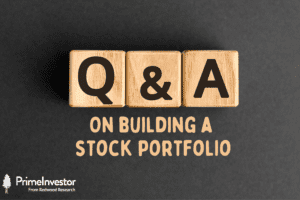
FAQs on building a stock portfolio
Building a stock portfolio is not easy, but it’s not terribly hard either. Aarati Krishnan gives useful pointers in this QA article on building a stock portfolio.

Building a stock portfolio is not easy, but it’s not terribly hard either. Aarati Krishnan gives useful pointers in this QA article on building a stock portfolio.

You should be able to make do with just 4 to 12 funds in your entire mutual fund portfolio to meet all your goals

One of the very first questions you’ll be faced with after deciding to buy a term insurance plan, is – What’s the size of the term cover (what insurers call the sum assured) you’ll need?
Most folks don’t put much thought into this and go for the nice round number suggested by their insurance agent, which is usually Rs 1 crore. You can online calculators, but they can throw up widely diverging numbers.

Apart from the fund manager’s skill, a hidden factor that explains such return differences is the investment styles in which each fund is managed. Right now, many of the funds that have managed to top the charts with a 16% return are value-style funds, while the laggards are growth-oriented ones.
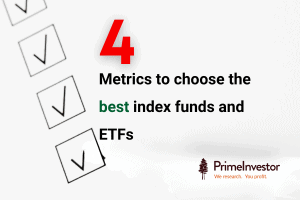
“Which equity fund should I buy?” When asked an open-end question like this, most financial experts recommend an index fund. Choosing an index fund is supposed to be far easier than choosing an active fund from the hundreds of schemes. But the number and variety of index funds in India has mushroomed too. There are about 94 open-end equity index funds, while over 120 equity Exchange Traded Funds (ETFs) are listed on the exchanges. So, if you’re thinking of buying an index fund, how do you choose the right one? Here are four metrics to choose the best index funds and ETFs.

If you’re new to stock investing or aren’t quite sure how our stock recommendations fit into your investment plans, we hope this article on constructing a stock portfolio will help you.
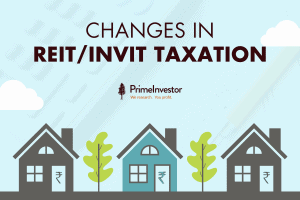
For Indian investors looking for regular income with the possibility of capital appreciation, Real Estate Investment Trusts (REITs) and Infrastructure Investment Trusts (InvITs) are good vehicles. These entities own a bunch of real estate or infrastructure assets that throw up regular cash flows and distribute over 90% of their cash flows to their investors. As both their income and the value of the real estate or infrastructure portfolio they own can rise over time, REITs and InvITs offer the prospect of rising income with capital gains.

After lying low for a while, gold as an asset class has woken up from its long slumber in the last six months. International gold prices, which fell by 3.3% in 2021 and 0.3% in 2022, have gained 9% so far in 2023 (as of April 11) and are up by 20% in the last six months. In India, gold prices recently bounced off a lifetime high of over Rs 61,000/10 grams, having gained 18% in the last six months. This recent run has made investors sit up and take notice of sovereign gold bonds, gold ETFs and other vehicles to own gold. But should you jump on the bullion bandwagon now?

Debt investors have been so starved of good returns lately, that any return above 7% now seems like a grand prize. This is why, after the government recently announced an interest rate of 7.7% per annum on National Savings Certificates (NSC) for the April-June 2023 quarter, there was much jubilation. Apart from warranting a fresh look at the NSC itself, this rate hike promises to significantly lift returns on a Central government-backed instrument – GOI Floating Rate Savings Bonds 2020 (GOI FRSB).
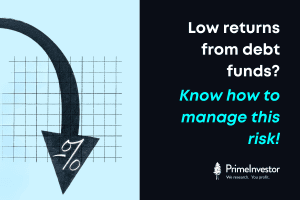
Low returns from debt funds? Know how to manage this risk!
After Silicon Valley Bank revealed large losses on its US bond portfolio that had eaten into its capital, there’s been a lot of social media outrage. Some folks are shocked that banks can make losses on a cast-iron investment such as US treasuries. Others seem to be appalled that Silicon Valley Bank is not alone and that many other global banks are in the same boat. This shows that investors at large have only a vague understanding of what rising interest rates do to bond portfolios.
You have also been bombarding us with questions on how interest rate risks can play out for debt funds, particularly target maturity, constant maturity and gilt funds. We try to address them here.
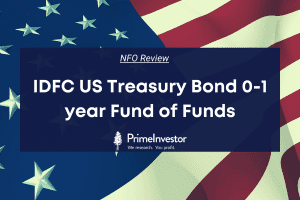
US stocks and US equity funds have been quite a hit with Indian investors in recent years. Indians invest in these funds to gain exposure to global businesses (Amazon, Alphabet, Mastercard etc). More importantly, they would like to gain an exposure to the US dollar which has appreciated steadily against the Rupee over the years.
But the risks in owning US equities have become apparent lately, with the Fed on a rate hiking spree and the US economy flirting with a recession. US stock indices have lost 12-15% in one year, while US equity funds have seen losses of 6%-12%. But there has been a sharp rise in yields on US government bonds (treasuries).
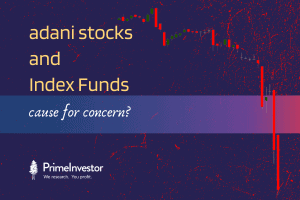
After the Hindenburg bombshell tanked Adani stocks, the faith that some investors placed in index investing seems to have been shaken. With the Nifty 50 and Nifty Next 50 featuring seven Adani group stocks between them, PrimeInvestor received many queries soon after the news broke.
Legal Disclaimer : PrimeInvestor Financial Research Pvt Ltd (with brand name PrimeInvestor) is an independent research entity offering research services on personal finance products to customers. We are a SEBI registered Research Analyst (Registration: INH200008653). The content and reports generated by the entity does not constitute or is not intended to constitute an offer to buy or sell, or a solicitation to an offer to buy or sell financial products, units or securities. All content and information are provided on an ‘as is’ basis by PrimeInvestor Financial Research Pvt Ltd. Information herein is believed to be reliable but PrimeInvestor Financial Research Pvt Ltd does not warrant its completeness or accuracy and expressly disclaims all warranties and conditions of any kind, whether express or implied. The services rendered by PrimeInvestor Financial Research Pvt Ltd are on a best-effort basis. PrimeInvestor Financial Research Pvt Ltd does not assure or guarantee the user any minimum or fixed returns. PrimeInvestor Financial Research Pvt Ltd or any of its officers, directors, partners, employees, agents, subsidiaries, affiliates or business associates will not liable for any losses, cost of damage incurred consequent upon relying on investment information, research opinions or advice or any other material/information whatsoever on the web site, reports, mails or notifications issued by PrimeInvestor Financial Research Pvt Ltd or any other agency appointed/authorised by PrimeInvestor Financial Research Pvt Ltd. Use of the above-said information is at the user’s own risk. The user must make his own investment decisions based on his specific investment objective and financial position and using such independent advisors as he believes necessary. All intellectual property rights emerging from this website, blog, and investment solutions are and shall remain with PrimeInvestor Financial Research Pvt Ltd. All material made available is meant for the user’s personal use and such user shall not resell, copy, or redistribute the newsletter or any part of it, or use it for any commercial purpose. PrimeInvestor Financial Research Pvt Ltd, or any of its officers, directors, employees, or subsidiaries have not received any compensation/ benefits whether monetary or in kind, from the AMC, company, government, bank or any other product manufacturer or third party, whose products are the subject of its research or investment information. The performance data quoted represents past performance and does not guarantee future results. Investing in financial products involves risk. Investments are subject to market risk. Please read all related documents carefully. As a condition to accessing the content and website of PrimeInvestor Financial Research Pvt Ltd, you agree to our Terms and Conditions of Use, available here. This service is not directed for access or use by anyone in a country, especially the USA, Canada or the European Union countries, where such use or access is unlawful or which may subject PrimeInvestor Financial Research Pvt Ltd or its affiliates to any registration or licensing requirement.
Investment in securities market are subject to market risks. Read all the related documents carefully before investing.
Compliance Officer Details: Name: Srikanth Meenakshi; Email: contact@primeinvestor.
Grievance Officer Details: Name: Srikanth Meenakshi; Email: contact@primeinvestor.
Hold On
You are being redirected to another page,
Get stock & mutual fund recommendations